A few folks expressed interest in the presentations we’ve done in the store lately (which they noticed on facebook or twitter) asking for me to share at least some of what I taught.
I have a few different talks I’ve been giving in recent years about the role of books in our lives, the value of reading, how those who follow Jesus are called to develop a “renewed mind” and a Christian perspective on their life and times. Books obviously can play a huge part in Christian discipleship, especially as our world grows increasingly complex and older ways are being forgotten and/or challenged. Reading books – old ones and new ones – can be a discipline of spiritual formation and a sign of a healthy life and mature faithfulness.
The other night we had an upbeat gathering with friends from Shippensburg University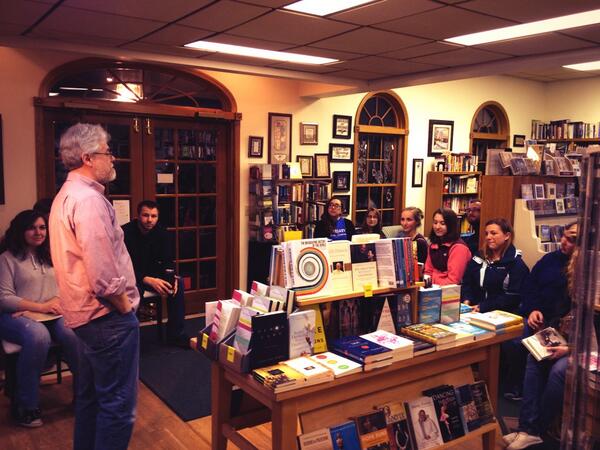 and Juniata College; the next day we hosted a group from Eastern University and we had a lot of fun. Thanks to the students who came for this bookish field trip, and their good humor in putting up with my dumb jokes and melodramatic stories. Your interest in “taking every thought captive” by learning to (re)think Christianly is an inspiration. We tip our hats to you as you commit yourself to being life-long learners. I hope we can stay in touch.
and Juniata College; the next day we hosted a group from Eastern University and we had a lot of fun. Thanks to the students who came for this bookish field trip, and their good humor in putting up with my dumb jokes and melodramatic stories. Your interest in “taking every thought captive” by learning to (re)think Christianly is an inspiration. We tip our hats to you as you commit yourself to being life-long learners. I hope we can stay in touch.
Here is a basic outline of what we shared with these energetic customers and friends and a few of the books I cited. After mentioning the way the Jubilee conference in Pittsburgh so influenced us decades ago, I offered 7 points.
1. Books can be our friends.
I don’t mean to suggest that curling up with a book is a substitute for real-world friends. I suppose some introverts can use books as an excuse to not develop abiding friendships, but for many of us, despite good friends and family and extended community, there are times when an author gets what we are going through and gives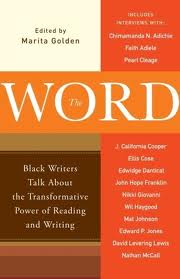 voice to our own predicaments better than anyone else. I love to read out loud a powerful set of paragraphs, episodes of how books offered insight and solace to novelist Marita Golden. Those first few pages of The Word: Black Writers Talk About the Transformative Power of Reading and Writing (Broadway Books; $14.99) are worth the price of the book, eloquently naming reading experiences that were formative for her. I’ve used these pages in workshops many times, and my voice still quivers as she talks about reading The Beloved and how it made her brave to face suffering. I asked students if this resonated with them, if this was true for them (a character in a novel understanding them better than anyone) and I saw many heads nodding. Yes, books can be our friends.
voice to our own predicaments better than anyone else. I love to read out loud a powerful set of paragraphs, episodes of how books offered insight and solace to novelist Marita Golden. Those first few pages of The Word: Black Writers Talk About the Transformative Power of Reading and Writing (Broadway Books; $14.99) are worth the price of the book, eloquently naming reading experiences that were formative for her. I’ve used these pages in workshops many times, and my voice still quivers as she talks about reading The Beloved and how it made her brave to face suffering. I asked students if this resonated with them, if this was true for them (a character in a novel understanding them better than anyone) and I saw many heads nodding. Yes, books can be our friends.
2. Books can expand our horizons, offering windows into the lives of others.
If we had time, I would have loved to have heard stories about this from our young friends. Interestingly, it has been shown in the research: readers tend to be more empathetic than non-readers. Traits such as compassion can be nurtured and deepened by reading widely. There is great truth in that well known cliché about walking a mile in another’s shoes, and reading novels, history, poetry, and (I believe) especially memoirs, allows us to realize how others construe their lives. I suggested that it is an act of loving our neighbors to want to be curious about them, desiring to understand what others go through. Books can really help us. Perhaps you are already compassionate and kind and observant enough to love others well. Or, perhaps, like most of us, you need all the help you can get. Tolle legge, I say.
I mentioned a few of my favorite memoirs that have helped illuminate the experience of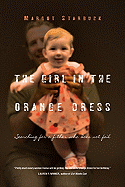 somebody bringing insights I wouldn’t have easily obtained otherwise. For instance, I recommended Margot Starbuck’s moving story about adoption and loss and healing, The Girl in the Orange Dress: Searching for a Father Who Does Not Fail (IVP; $16.00.) Poet L.L. Barkett’s first book, Stone Crossings: Finding Grace in Hard and Hidden Places (IVP; $15.00) is another moving memoir I revisit and commend for those needing to know about hosting hard times with redemptive imagination. What a moving experience it was to read about the lives of Mary Karr or Jeannette Walls or Kim Barnes. Biographies of course can do this — I hope you’ve read something on Wilberforce and Bonhoeffer, at least, and maybe a few missionary bios. I especially suggested that these white students read work written by people of color. Of course there
somebody bringing insights I wouldn’t have easily obtained otherwise. For instance, I recommended Margot Starbuck’s moving story about adoption and loss and healing, The Girl in the Orange Dress: Searching for a Father Who Does Not Fail (IVP; $16.00.) Poet L.L. Barkett’s first book, Stone Crossings: Finding Grace in Hard and Hidden Places (IVP; $15.00) is another moving memoir I revisit and commend for those needing to know about hosting hard times with redemptive imagination. What a moving experience it was to read about the lives of Mary Karr or Jeannette Walls or Kim Barnes. Biographies of course can do this — I hope you’ve read something on Wilberforce and Bonhoeffer, at least, and maybe a few missionary bios. I especially suggested that these white students read work written by people of color. Of course there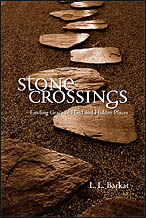 are classics like The Autobiography of Malcolm X (Penguin Classics; $16.00) or Martin Luther King’s first book, Stride Toward Freedom (Beacon; $14.00.) More recent decades have given us classics like The Color of Water: A Black Man’s Tribute to His White Mother by James McBride (Riverhead; $16.00) and Patricia Rayburn’s My First White Friend: Confessions on Race, Love and Forgiveness (Penguin; $15.00) and dramatic faith stories like John Perkin’s Let Justice Roll Down (Regal; $14.99.) I showed off our section that includes books about Latino studies, Asian-American and Native American writings.
are classics like The Autobiography of Malcolm X (Penguin Classics; $16.00) or Martin Luther King’s first book, Stride Toward Freedom (Beacon; $14.00.) More recent decades have given us classics like The Color of Water: A Black Man’s Tribute to His White Mother by James McBride (Riverhead; $16.00) and Patricia Rayburn’s My First White Friend: Confessions on Race, Love and Forgiveness (Penguin; $15.00) and dramatic faith stories like John Perkin’s Let Justice Roll Down (Regal; $14.99.) I showed off our section that includes books about Latino studies, Asian-American and Native American writings.
Even this week I am enthralled by Cheryl Strayed’s wonderful, searing novel about a family coping with cancer. I recall not long ago Beth and I both reading a novel about some colorful characters in a nursing home which brought new insight. And my horizon’s have been significantly widened by the wonderful writing of Barbara Kingsolver.
By the way, although I didn’t mention it in this presentation, whenever I’ve talked to clergy or Christian leaders lately, I insist they read the tremendous Reading for Preaching: The Preacher in Conversation with Storytellers, Biographers, Poets and Journalists by Cornelius Plantinga, Jr. (Eerdmans; $14.00.) I can’t say enough about this wondrous book and how it shows how an intentionally wide reading plan for pastors can make them better preachers. We first talked about it at BookNotes here and named it as one of the Best Books of 2013, here.
3. Authors can be mentors.
I shared that I hoped these young people have found real-world mentors, people who can serve them as leaders, coaches, guides, counselors and pastors. The students came with older friends from the campus ministry CCO so I know they have trained Christian leaders “investing” in them, as they sometimes put it. However, even if you are blessed with an approachable pastor and a wise older friend or two, there are things in our lives that our leaders can’t answer. Books can present an amazing array of information, can model wisdom and faithfulness, can point us in the right direction. Authors can be trail guides, accompanying us on the journey and we should draw on their riches generously.
I suggested that they find an good author or two, and pledge to read everything that author writes. After a while, you may come to know that author well; some of us have been known to correspond with our literary mentors. (There’s a fine line between legitimate conversation and, uh, stalking. Just saying.)
For me, there are important authors whose words have come to mean the world to me –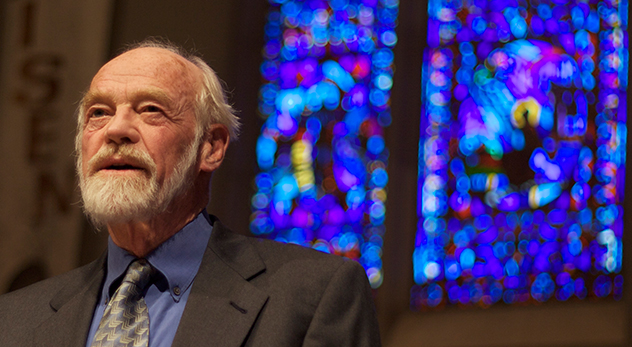 these include Marva Dawn and Eugene Peterson, Ruth Haley Barton and Lauren Winner, Os Guinness and Ron Sider, Brian Walsh and Sylvia Keesmaat, Calvin Seerveld and Walter Brueggemann, Richard Mouw, Steve Garber, Richard Foster, and others.
these include Marva Dawn and Eugene Peterson, Ruth Haley Barton and Lauren Winner, Os Guinness and Ron Sider, Brian Walsh and Sylvia Keesmaat, Calvin Seerveld and Walter Brueggemann, Richard Mouw, Steve Garber, Richard Foster, and others.
There are also authors I truly adore – I think of Barbara Brown Taylor (whose brand new Learning to Walk in the Dark [HarperOne; $24.99] just arrived today!) or Sarah Miles – who I don’t particularly think of as mentors or friends even though I love their writing and appreciate their books. There are a number of authors I read consistently, even if I find myself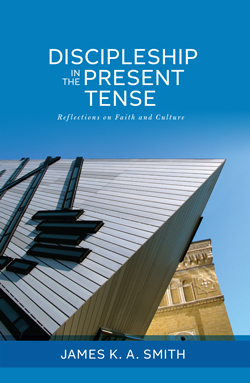 disagreeing with them more often then not. That’s okay, you know.
disagreeing with them more often then not. That’s okay, you know.
Funny, I didn’t name most of these favorite authors of mine, but told about my personal appreciation for Ruth Haley Barton’s books about the interior life and testified that in the last decade the work and friendship with Jamie Smith has been very, very important to me. I told them about a great way to dip in to his insights is in the anthology Discipleship in the Present Tense: Reflections on Faith and Culture (Calvin College Press; $14.00.)
4. Books can inspire us to live with passion.
Of course (again, again) we can be inspired to live well by poets and journalists, by fiction and non-fiction. Who hasn’t read the poems of Wendell Berry, or his Hannah Coulter (Shoemaker & Hoard; $14.95) or Jayber Crow (Counterpoint; $15.95) and not wanted a better marriage or a clearer sense of the past? Oh, how I recall the first time I read Whitman’s “When I Heard the Learn’d Astronomer” or that line from Thoreau about leading lives of “quiet desperation.” I was deeply moved by all of John Piper’s short biographies in his “Swans are Not Silent” series, but especially so by the volume that looked at John Newton, Charles Simeon and William Wilberforce as he documented their “invincible perseverance” in The Roots of Endurance (Crossway; $14.99)
For my purposes with these students, I wanted to introduce them to vibrant evangelical authors who invite us to robust, rowdy discipleship, who embody the abundant life of John 10:10. That may be for me Walter Brueggemann or Leonard Sweet, but I gave the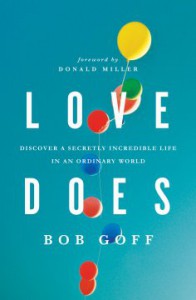 shout out to Bob Goff, who they know from Jubilee – I am such a fan of Love Does: Discover a Secretly Incredible Life (Nelson; $16.99), and hope you know that the DVD curriculum is available, a fine 5 week immersion in passion and joy and guts and winsome adventure. Many young adults appreciate the passionate approach of Radical: Taking Back Your Faith from the American Dream by David Platt (Multnomah; $14.99) and Crazy Love: Overwhelmed by a Relentless God by Francis Chan (Cook; $15.99) or Don’t Waste Your Life by the uber-passionate Baptist preacher, John Piper (Crossway; $13.99.) I suggested the solid collection of neo-Puritan sermons so passionately delivered over the years at the huge Passion Conferences – it is edited by Louie Giglio and called Passion: The Bright Light of Glory (Nelson; $15.99.) Because of his diligence in putting together these big worship festivals, I can hardly think of an evangelical leader who has been more influential in recent years. For those who haven’t caught the vision of the counter-cultural implications of serious faith, I’d recommend The Irresistible Revolution: Living as an Ordinary Radical by Shane Claiborne
shout out to Bob Goff, who they know from Jubilee – I am such a fan of Love Does: Discover a Secretly Incredible Life (Nelson; $16.99), and hope you know that the DVD curriculum is available, a fine 5 week immersion in passion and joy and guts and winsome adventure. Many young adults appreciate the passionate approach of Radical: Taking Back Your Faith from the American Dream by David Platt (Multnomah; $14.99) and Crazy Love: Overwhelmed by a Relentless God by Francis Chan (Cook; $15.99) or Don’t Waste Your Life by the uber-passionate Baptist preacher, John Piper (Crossway; $13.99.) I suggested the solid collection of neo-Puritan sermons so passionately delivered over the years at the huge Passion Conferences – it is edited by Louie Giglio and called Passion: The Bright Light of Glory (Nelson; $15.99.) Because of his diligence in putting together these big worship festivals, I can hardly think of an evangelical leader who has been more influential in recent years. For those who haven’t caught the vision of the counter-cultural implications of serious faith, I’d recommend The Irresistible Revolution: Living as an Ordinary Radical by Shane Claiborne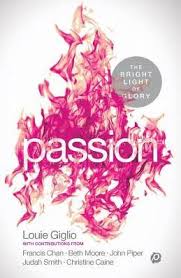 (Zondervan; $15.99) — here’s hoping it’s popularity doesn’t fade. Donald Miller’s story about making his life a story, A Million Miles in a Thousand Days: How I Learned to Live a Better Story,(Nelson; $15.99) is invaluable for those wanting to reconsider the trajectory of their lives.
(Zondervan; $15.99) — here’s hoping it’s popularity doesn’t fade. Donald Miller’s story about making his life a story, A Million Miles in a Thousand Days: How I Learned to Live a Better Story,(Nelson; $15.99) is invaluable for those wanting to reconsider the trajectory of their lives.
Anyway, authors can inspire us, books can enlarge our hearts, we can be motivated, challenged and pushed into greater love and service. I hope you have somebody who kindly does what Hebrews 10:24 tells us to do – prod one another one to love and good deeds – but if not, you can easily let the printed page do that for you. I dared our guests to find an author who truly inspired them to live with abandon, passion and wild grace.
5. Books can help guide us into a truly Christian worldview and “prophetic imagination.”
I must admit that this is where I spent most of the time in the talk, reflecting on what we mean by a worldview, what distinctive Christian thinking and cultural engagement might be like, how not to be accommodated by the spirits of the age, and how to be “in but not of” the world as Jesus instructs. I do not doubt that many of us know quit a bit about our faith, we have agreed with many Biblical truths and try our best to live them; we can check off the proper religious ideas — indeed, we might be able to check off the cornerstones of a comprehensive Christian worldview. But intellectual assent to ideas, even ideas about the comprehensive nature of faith and God’s redemptive plan for “every square inch’ of creation, does not mean that our interpretation of life, our vision and imagination, and the lifestyles we embody are thereby reliably Christian.
I have said this myself since I first learned the world weltanschauung in the 1970s and yet had a hunch that something was fishy among some who were obsessed with the notion of worldviews; I love the way Steve Garber got at it in his profound first book with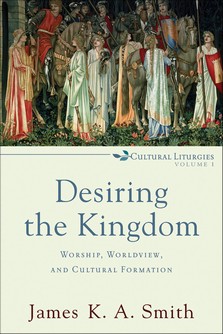 the great title and subtitle, Fabric of Faithfulness: Weaving Together Believe and Behavior (IVP; $17.00.) This critique of how we’ve described and taught worldviews has been a major concern advanced wonderfully by James K.A. Smith in his very important Desiring the Kingdom: Worship, Worldview, and Cultural Formation (Baker; $22.99) which reminds us that our way of life embodied in the world reflects our deepest longings and desires, not just our intellectual notions. The process of being “non-conformed to the ways of this world” and having a “renewed mind” and having our bodies be spiritual worship services – see Romans 12:1-2, once again – takes a lot of intentional work, not least of which is reflecting on the ideas of worldviews, spiritual practices, and the orientation of our way of life. By the way, one of the little books that have helped with that recently (without exactly being a “worldview” book) is the fantastic Case for the Psalms: Why They Are Essential by N.T. Wright (HarperOne; $22.99.) he shows there how immersing ourselves in the Psalms will effect our view of time, space, and matter. Had I had time, I would have quoted some of that to our young guests, showing how being shaped by the liturgical cosmology of the Psalms will take us a good way into seeing the world as God wants us to.
the great title and subtitle, Fabric of Faithfulness: Weaving Together Believe and Behavior (IVP; $17.00.) This critique of how we’ve described and taught worldviews has been a major concern advanced wonderfully by James K.A. Smith in his very important Desiring the Kingdom: Worship, Worldview, and Cultural Formation (Baker; $22.99) which reminds us that our way of life embodied in the world reflects our deepest longings and desires, not just our intellectual notions. The process of being “non-conformed to the ways of this world” and having a “renewed mind” and having our bodies be spiritual worship services – see Romans 12:1-2, once again – takes a lot of intentional work, not least of which is reflecting on the ideas of worldviews, spiritual practices, and the orientation of our way of life. By the way, one of the little books that have helped with that recently (without exactly being a “worldview” book) is the fantastic Case for the Psalms: Why They Are Essential by N.T. Wright (HarperOne; $22.99.) he shows there how immersing ourselves in the Psalms will effect our view of time, space, and matter. Had I had time, I would have quoted some of that to our young guests, showing how being shaped by the liturgical cosmology of the Psalms will take us a good way into seeing the world as God wants us to.
Students who hang around the CCO hear a lot about worldview formation and not a few can recite the valuable chapters of the unfolding Biblical drama – creation, fall, redemption, restoration. Many of become familiar with understand the Bible well by using resources such as The True Story of the Whole World: Finding Your Place in the Biblical Drama by reformational philosophers and worldview scholars Michael Goheen & Craig Bartholomew (Faith Alive; $15.99.) I’m glad for this.
But, to be honest, I chided them a bit for not actually studying the idea of worldview, knowing well what is really meant by that, and the amazing fruitfulness of being fluent in that discourse, astute in those conversations. What good does it do to chant “creation/fall/redemption” if our imaginations are not shaped by those truths? (Yes, that was an cryptic allusion to Jeremiah 7:4.) I think if I had one wish for this generation of religious book buyers it would be that they would read more books about worldview. We may have one of the largest selections of such books, and hardly anybody every buys them.
Here are a few I showed that I recommended to our guests:
C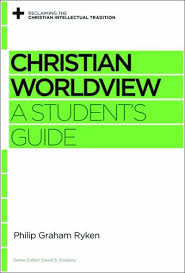 hristian Worldview: A Students Guide Philip Graham Ryken (Crossway) $11.99 An expansion of a smaller booklet we also carry, this pocket sized book is worth its weight in gold. Short, insightful, smart and nicely written, it is very helpful. Highly recommended for a great start or a fresh reminder.
hristian Worldview: A Students Guide Philip Graham Ryken (Crossway) $11.99 An expansion of a smaller booklet we also carry, this pocket sized book is worth its weight in gold. Short, insightful, smart and nicely written, it is very helpful. Highly recommended for a great start or a fresh reminder.
Creation Regained: Biblical Basics for a Reformational Worldview Al Wolters (Eerdmans)$15.00 I cannot underestimate the significance of this book; if it is not cited in a book on this topic, I’d be surprised. I told a few stories about it and it’s good impact on those who have grasped it. I also suggested that the chapter called “Structure & Direction” needs to be studied, profoundly. It’s important.
Transforming Vision: Shaping a Christian Worldview Brian Walsh & Richard Middleton (IVP) $18.00 I still say this is the best book on the subject — it traces (briefly) an overview of Western culture, the history of dualism, the rise of the idols of our time. It raises a beautiful call for college 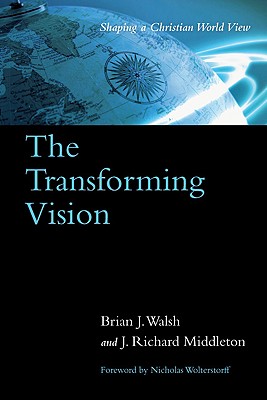 students to do their studies in community, as counter-cultural agents, dreaming how God’s reign might impact their future careers. This is an amazing book, not to be missed. I am sure you will learn something new, and be challenged in significant ways, no matter who you are. If you haven’t looked at it in a while, get it out, dust it off. I’m convinced it is more needed now then ever.
students to do their studies in community, as counter-cultural agents, dreaming how God’s reign might impact their future careers. This is an amazing book, not to be missed. I am sure you will learn something new, and be challenged in significant ways, no matter who you are. If you haven’t looked at it in a while, get it out, dust it off. I’m convinced it is more needed now then ever.
Desiring the Kingdom: Worship, Worldview, and Culture James K.A. Smith (Baker) $22.99 I don’t think it is unfair to suggest that this is an expansion of themes that are hinted at in Transforming Vision. Smith studied under Walsh, and although he is now a professional philosopher of considerable fame, he owes much to TV. This is, I’ve regularly said, one of the most important and influential books of our time. I mean it.
6. Books can help us understand and discern our callings.
That we don’t view our jobs as essential to the Kingdom work of God and that we sometimes aren’t clear about the various callings and vocations to which we are called is, I suggested, an indication that we don’t really “think Christianly” out of a Christian worldview – a strong view of vocation is at the heart of a Christian worldview, after all, and insofar as we rarely hear about work in our churches and Bible studies, we have failed to well integrate Sunday and Monday. A dualism which divides the so-called sacred from the secular – in some churches overt, but most often covert – plagues us still, and few church folk buy books about science, art, education, engineering, math, teaching, eating, shopping, voting. I take this as an indication that there isn’t much interest in thinking about living out faith day by day and although I know some intuit their way into doing this with beauty and grace, and that some churches offer study groups or Sunday school classes, the commitment to think deeply about all this just isn’t very evident. I’ve been inviting people to this habit of integration of faith and learning around their jobs and careers for more than three decades and, to be honest, still don’t see much evidence that God’s people care about studying what it means to be faithful in every zone of life, including their work and careers.
So, we start with Steve Garber’s slogan, “vocation is integral, not incidental, to the mission dei.” We can use Al Wolters or Walsh & Middleton to open up the “cultural mandate” from Genesis 1:26-28. We help people learn what it means to respond to God’s call, to take up work that is a blessing for the common good, as the realize their task to bear God’s image opening up the creation’s possibilities.
Sadly, most people still don’t show much interest, but I invited these students to read these kinds of books, knowing well, deep in their bones, the insights offered by these sorts of books. If they’ve been to Jubilee, for instance, they’ve heard some of this, but I wanted to be clear why it is so important that we study, read, and learn as much as we can about this most often missed central Biblical teaching.
Here are some of the books I held up. I’m impressed that the bought some of these — yay!
J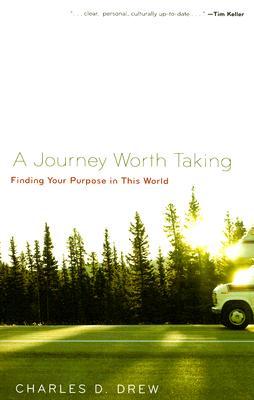 ourney Worth Taking: Finding Your Purpose in This World Charles Drew (Presbyterian & Reformed) $12.99 This is a great price for a great book, not unlike Purpose Driven Life, perhaps, but better — much better. This mature, thoughtful, energetic overview of our calling to explore our vocations is just tremendous.
ourney Worth Taking: Finding Your Purpose in This World Charles Drew (Presbyterian & Reformed) $12.99 This is a great price for a great book, not unlike Purpose Driven Life, perhaps, but better — much better. This mature, thoughtful, energetic overview of our calling to explore our vocations is just tremendous.
C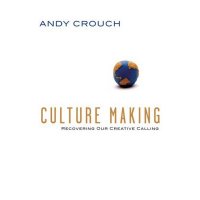 ulture Making: Recovering Our Creative Calling Andy Crouch (IVP) $20.00 I know most readers of BookNotes know that I am fond of this book, and you won’t be surprised that I named it as a “must read” for those interested in developing a fruitful vision of vocation. If you still haven’t caught on to why we like this, watch this 37- minute video of Andy’s fantastic talk at Jubilee 2014. Don’t miss the end when he plays Bach, and talks about it. Praise the Lord for such good, good stuff. Am I right?
ulture Making: Recovering Our Creative Calling Andy Crouch (IVP) $20.00 I know most readers of BookNotes know that I am fond of this book, and you won’t be surprised that I named it as a “must read” for those interested in developing a fruitful vision of vocation. If you still haven’t caught on to why we like this, watch this 37- minute video of Andy’s fantastic talk at Jubilee 2014. Don’t miss the end when he plays Bach, and talks about it. Praise the Lord for such good, good stuff. Am I right?
T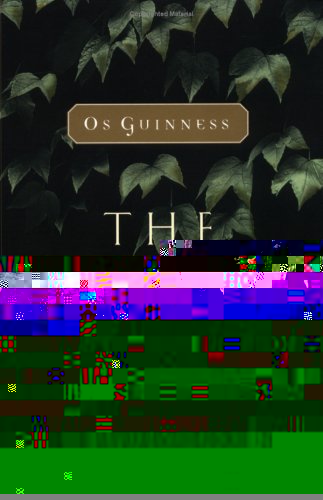 he Call: FInding and Fulfilling the Central Purpose of Your Life Os Guinness (Thomas Nelson) $17.99 This handsome paperback has great stories, is eloquently written, and remains one of my top three or four books, ever. This book names so much of what we are about, and this approach has born such good fruit among those who embrace it, I cannot speak more highly about it. Smart, deep, with short chapters and good discussion questions.
he Call: FInding and Fulfilling the Central Purpose of Your Life Os Guinness (Thomas Nelson) $17.99 This handsome paperback has great stories, is eloquently written, and remains one of my top three or four books, ever. This book names so much of what we are about, and this approach has born such good fruit among those who embrace it, I cannot speak more highly about it. Smart, deep, with short chapters and good discussion questions.
V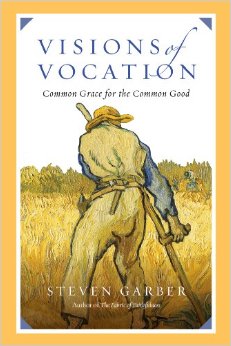 isions of Vocation: Common Grace for the Common Good Steve Garber (IVP) $16.00 Steve gives much respect to Os for influencing his own vision of vocation, but this book moves in such interesting directions — asking how we can take up our love for the world, knowing it is so broken, without growing sour on our hopes to make a difference. Can we resist stoicism? Cynicism? With these kinds of moving stories and bits of astute cultural observation and well drawn quotes from novels and films, this is truly one of the great books of our time. I told about how we launched it at Jubilee, and pressed it hard into the hands of some of these students with us the other night. I’m very, very glad to tell people about this.
isions of Vocation: Common Grace for the Common Good Steve Garber (IVP) $16.00 Steve gives much respect to Os for influencing his own vision of vocation, but this book moves in such interesting directions — asking how we can take up our love for the world, knowing it is so broken, without growing sour on our hopes to make a difference. Can we resist stoicism? Cynicism? With these kinds of moving stories and bits of astute cultural observation and well drawn quotes from novels and films, this is truly one of the great books of our time. I told about how we launched it at Jubilee, and pressed it hard into the hands of some of these students with us the other night. I’m very, very glad to tell people about this.
Work Matters: Connecting Sunday Worship with Monday Work Tom Nelson (Crossway)$15.99 I’ve often said this is the best overall book on this for those starting out in the journey of relating faith and work. A few students who will soon graduate wanted this, and although some of the above books could be read first, this is a lovely little gem. Highly recommended.
E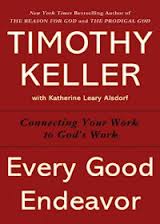 very Good Endeavor: Connecting Your Work to God’s Work Timothy Keller & Katherine Leary Alsdorf (Dutton) $26.95 I told the students that this is the creme of the crop, the Cadillac of this whole genre — it really is the best. It is a shame the publisher insisted on making it so expensive (speaking of business ethics; Keller’s people should have put their foot down on this!) Still, I wouldn’t be without this masterpiece, and we take it nearly everywhere we go, hoping that serious readers will want to explore what it means to think redemptively and live well in the modern work-world.
very Good Endeavor: Connecting Your Work to God’s Work Timothy Keller & Katherine Leary Alsdorf (Dutton) $26.95 I told the students that this is the creme of the crop, the Cadillac of this whole genre — it really is the best. It is a shame the publisher insisted on making it so expensive (speaking of business ethics; Keller’s people should have put their foot down on this!) Still, I wouldn’t be without this masterpiece, and we take it nearly everywhere we go, hoping that serious readers will want to explore what it means to think redemptively and live well in the modern work-world.
7. Books can be teachers to help us think Christianly about our studies.
Although this final point was crafted to inspire these undergrads, the point might be considered by all of us. Once we understand God’s comprehensive plan for redeeming this fallen, idolatrous and dysfunctional world, and how those who are in Christ are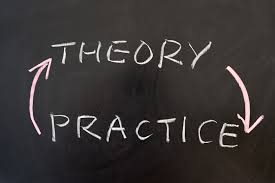 called to particular avenues of service for the common good, the question becomes burningly urgent: what does that look like? What does in mean, in terms of professional practices, stuff we do day by day, to be God’s agents of reconciliation in the careers and callings which we consider holy vocations? Are there books that can help us here? You bet!
called to particular avenues of service for the common good, the question becomes burningly urgent: what does that look like? What does in mean, in terms of professional practices, stuff we do day by day, to be God’s agents of reconciliation in the careers and callings which we consider holy vocations? Are there books that can help us here? You bet!
The student of C.S. Lewis who himself went on to write so well, Harry Blamires, famously insisted that there is no longer a “Christian mind.” Walsh & Middleton and others have asked what Christian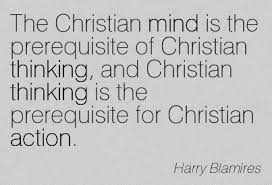 scholarship actually looks like, for a typical university students, taking her classes, reading her texts, writing her papers. If we had more time with the students, I’d have explored this a bit more deeply.
scholarship actually looks like, for a typical university students, taking her classes, reading her texts, writing her papers. If we had more time with the students, I’d have explored this a bit more deeply.
This point isn’t just for students, though. We can press the questions into any career, yours and mine. Does a health care provider need to rethink certain things she has learned about the body and pain and medicine? Does an engineer need to question the prevailing assumptions about the role of technology? What kind of lending practices will a Christian banker propose and what kind of discipline (or assignments, or tests, or grading styles) does a faithful school teacher administer? Does faith make an impact on lawyering; do religious commitments offer resources for being different in the world of retail or research? In what ways does a Christian whose calling is to work in programming think about digital culture? What about an actor, journalist, artist, factory worker?
A Christian worldview creates a high view of vocation; a high and holy view of vocation demands that we think Christianly, in light of Biblical and theological categories, learning well the way the world really works. That is, I told the students, we must read the truths God embedded in the very creation itself, studying well the world, in light of the Word. (A verse in Isaiah suggests that a farmer learning the mundane but important ways of what seeds to plant when and where is actually a gift from the Lord. The farmer had to study the seeds and seasons, but it is still seen as knowledge that finally comes from God. Isn’t it such with all true learning?) The task of being salt and light and leaven in the postmodern world for all of us demands a certain commitment to what only can be called Christian scholarship. We think our bookstore can help you as we study our world, study our work, and imagine the details of an alternative way of serving in that arena. It means learning the history and development of a field and it also means learning the craft, the tools and practices of the trade, so to speak. Christian reading prepares us for doing our jobs with excellence and a holy attentiveness.
demands that we think Christianly, in light of Biblical and theological categories, learning well the way the world really works. That is, I told the students, we must read the truths God embedded in the very creation itself, studying well the world, in light of the Word. (A verse in Isaiah suggests that a farmer learning the mundane but important ways of what seeds to plant when and where is actually a gift from the Lord. The farmer had to study the seeds and seasons, but it is still seen as knowledge that finally comes from God. Isn’t it such with all true learning?) The task of being salt and light and leaven in the postmodern world for all of us demands a certain commitment to what only can be called Christian scholarship. We think our bookstore can help you as we study our world, study our work, and imagine the details of an alternative way of serving in that arena. It means learning the history and development of a field and it also means learning the craft, the tools and practices of the trade, so to speak. Christian reading prepares us for doing our jobs with excellence and a holy attentiveness.
TWO KEY VERSES
I gave them two verses about the role of theories, inviting them to be critical thinkers as they engage the material taught in their college courses. Whether at an evangelical college, a church-related one where church teachings are hermetically sealed off away from the classroom, relegated to the chapel alone, or at a public university where the spirit of secularism predominates, followers of Jesus simply must work hard to reflect on what they learn and whether it is consistent with and coherent within a Christian worldview.
Here are the two verses that invite us to this process of critical thinking, discernment, and re-engagement with the world of ideas, theories, thoughts, and constructs about what we do in this world. I suspect it might get them in some trouble, but I challenged them to take up their current calling as students and to be active learners, serious, well read, even doing what we call “double study” (reading a Christian book alongside their required reading, to compare and contrast the views of their topic from a perspective based upon Biblical assumptions and one based on other faiths/ideologies.)
Colossians 2:8
See to it that no one takes you captive through philosophy (that is) based on the traditions of men…
Although often used in apologetics, I think this has profound application for every student, studying anything, anywhere. And for you in me, in the workplace, as we evaluate political pundits, as we laugh our way through the latest sitcom. There are underlying ideals and values and visions of life beneath and around, implicit in everything taught, in every practice, in every cultural tool, in the habits of our workplace. For starters, I told them not to be hoodwinked and not to buy everything their professors profess. Or what every allegedly Christian books says.
Nonetheless, there is little doubt, good books are our allies in our efforts to obey this text.
2 Corinthians 10:5
…take every theory captive for Christ… This, of course, authorizes students to learn much, to think critically, but to place ideas within a larger framework of God’s own work in the world. If the previous text is a defensive warning, this one is, shall we say, more positive. There are tools to help us do this, and we sometimes need help from Christian philosophers, but we can indeed use the best thinking, learning much and applying ideas faithfully with discernment and imagination helping it build a comprehensive view. Books can help us sharpen our minds and learn the art of doing what this verse commands. Let us know if you need books about your particular area of study.
Y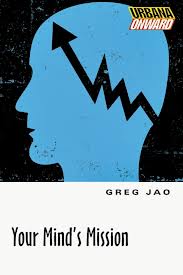 our Mind’s Mission Greg Jao (IVP) $5.00 If you’ve followed our blog much you know that we are so proud to be mentioned in this little booklet. It packs a real wollop as they say, with every page jam-packed with worldview-rocking information, freshly worded challenges, radical cultural observation and delightful inspiration to read, to think, to grow — all so we may serve God’s ways better in the world of great need. Missional? How about a missional mind? This is a Hearts & Minds manifesto if ever there was one!
our Mind’s Mission Greg Jao (IVP) $5.00 If you’ve followed our blog much you know that we are so proud to be mentioned in this little booklet. It packs a real wollop as they say, with every page jam-packed with worldview-rocking information, freshly worded challenges, radical cultural observation and delightful inspiration to read, to think, to grow — all so we may serve God’s ways better in the world of great need. Missional? How about a missional mind? This is a Hearts & Minds manifesto if ever there was one!
A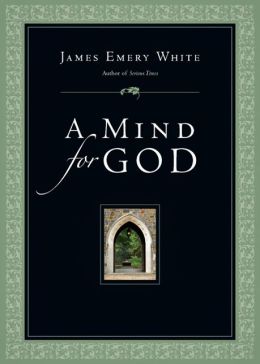 Mind for God James Emory White (IVP) $13.00 Every now and then I pull this out and read a bit of his lovely reminder of why reading matters, and how reading together as a family is such a good thing, and why we need books as allies in our journey to think well for God. It is a pocket sized paperback and worth every penny — well written, urgent, insightful. I love this lovely little gem. Get it for yourself if you like books about books or reading about learning. Or, get a few to give to those who a gentle reminder about the joy of learning, the call to nurture the Christian mind, and why our times call for thoughtful Christian engagement in the issues of the day.
Mind for God James Emory White (IVP) $13.00 Every now and then I pull this out and read a bit of his lovely reminder of why reading matters, and how reading together as a family is such a good thing, and why we need books as allies in our journey to think well for God. It is a pocket sized paperback and worth every penny — well written, urgent, insightful. I love this lovely little gem. Get it for yourself if you like books about books or reading about learning. Or, get a few to give to those who a gentle reminder about the joy of learning, the call to nurture the Christian mind, and why our times call for thoughtful Christian engagement in the issues of the day.
I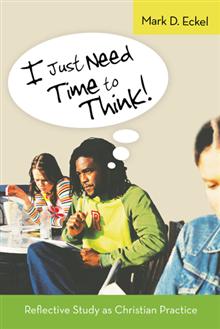 Just Need Time to Think: Reflective Study as Christian Practice Mark Eckel (Westbox) $13.95 I was happy to show these students this fine little collection of solid essays about the need to think well. I love the subtitle, don’t you? This inspires me a lot as it dips into the topic from many angles, offering short reminders of the call to use our minds, think well, be creative in our learning, and take the time to develop a mindset that is worthy of the name Christian. I like Eckel, and appreciate these very nice pieces.
Just Need Time to Think: Reflective Study as Christian Practice Mark Eckel (Westbox) $13.95 I was happy to show these students this fine little collection of solid essays about the need to think well. I love the subtitle, don’t you? This inspires me a lot as it dips into the topic from many angles, offering short reminders of the call to use our minds, think well, be creative in our learning, and take the time to develop a mindset that is worthy of the name Christian. I like Eckel, and appreciate these very nice pieces.
Learning for the Love of God: A Student’s Guide to Academic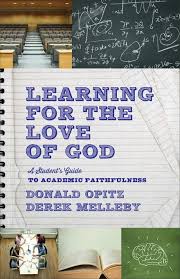 Faithfulness Donald Opitz & Derek Melleby (Brazos) $14.99 This used to be called The Outrageous Idea of Academic Faithfulness and to this day is the one book I would say every college student who cares about faith should own. There is nothing like it. If any of what I’ve written thus far intrigues you, get this. It is winsome, interesting, and very, very good.
Faithfulness Donald Opitz & Derek Melleby (Brazos) $14.99 This used to be called The Outrageous Idea of Academic Faithfulness and to this day is the one book I would say every college student who cares about faith should own. There is nothing like it. If any of what I’ve written thus far intrigues you, get this. It is winsome, interesting, and very, very good.
Engaging God’s World: A Christian Vision of Learning and Living Cornelius Plantinga, Jr. (Eerdmans) $16.00 I think this may be the most eloquent book yet written on the glories of being a Christian college student. Anyone interested in the big theme of God’s redemptive work and why learning much is vital — the basics of a Christian worldview — will surely appreciate this lovely provocative book.
Think: The Life of the Mind and the Love of God John Piper (Crossway) $15.99 What a passionate, Biblical, and useful contribution to learning for the greater glory of God. There are some insights here that are very impressive.
The Mind of the Maker Dorothy L. Sayers (HarperOne) $13.99 What a lovely, thoughtful book with good ruminations on various theological themes, but always with a view of how understanding these core truths help us appreciate our own creative tasks. A lovely introduction by Madeleine L’Engle makes this a very nice edition.
Certainly there is much more we could say about the role of books and the power of the printed page. I told some stories, read some excerpts, made some off-handed comments, got my tongue-tied and my “mix all talked up” a time or two. But it is always a joy to get to tell folks about why books matter, how reading is important, and why a relationship with a real bookseller that you trust is an important asset.
We hope this helps you recall your own favorite books, the things you value from reading, and — maybe — you’ll want to pick up a few of these that we so heartily recommend. We will deduct the 20% off of the regular prices shown. You can call us if you’d like, or just use our secure order form link shown below. We are grateful for your support.
DISCOUNT
ANY ITEM MENTIONED
20% off
order here
takes you to the secure Hearts & Minds order form page
just tell us what you want
inquire here
if you have questions or need more information
just ask us what you want to know
Hearts & Minds 234 East Main Street Dallastown, PA 17313 717-246-3333
read@heartsandmindsbooks.com
